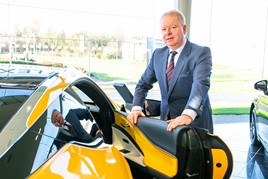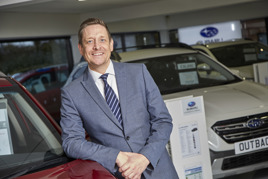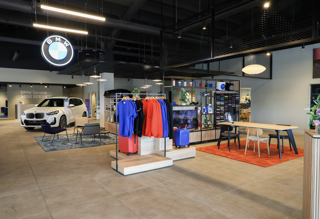Car retailers are expected to shrug off the key performance indicators (KPIs) of the past as they prepare for a 2023 economy which will see recessionary consumer spending habits layered on top of ongoing vehicle supply issues.
Dealer group leaders have told AM that new and used car supplies will remain top of their concerns as they head into 2023 with the hope of driving efficiencies while maintaining margins in a market evolving to accommodate a smaller car parc and – in some cases – agency model retail.
Nathan Tomlinson, dealer principal at Devonshire Motors, told AM he was “really positive” about his business’ prospects for 2023, but was clear that change was needed to achieve his goals. “You have to be realistic, and I think it’s probably healthy to start shedding some of our legacy comparisons, and even KPIs, so we free the entrepreneurial spirit necessary to make change,” Tomlinson (pictured) told AM. 
“We’ll be dealing with recessionary factors. If we happen to be matching the effects of Government-induced demand destruction with an oversupply of vehicles, then that might make it interesting. But, as we’ve learned over the past two or three years, the automotive sector is both smart and resilient. 2023 is just another year.”
Like many retailers, Tomlinson is not planning for “just another year”, however. He is currently working towards a three-year business plan that he hopes will allow the Hyundai and Isuzu franchised dealership to maintain financial performance while investing in its people and facilities.
Underpinning this will be a drive to automate “mundane tasks” while slashing the operating expenses. Tomlinson said: “We’ve just completed a full, managed services, energy-saving lighting installation which is projected to give us a 43% net saving in year one. Early in 2023 we’re aiming to have solar included alongside our £1 million site refurbishment, which will reduce our dependency on the National Grid to just 20%.”
Mark Mitchell, chief executive of Mitchell Motor Group, is in no doubt what will have the biggest impact on his business’ 2023 outlook – new vehicle stock. “Although we have enjoyed the best margins we’ve ever known, we want to be able to honour the orders of our customers in a reasonable timeframe and see the volume return that will improve our part-exchange situation in 2023,” Mitchell said.
“We’re not a huge operation, but we now find ourselves with 400 pipeline orders. It’s essential we deliver those and avoid cancellations because the truth is that our customers’ financial circumstances are changing fast.”
Almost half of respondents to a December 2022 AM survey of senior automotive retail sector leaders, run in partnership with JudgeService, described new vehicle supply as a “significant threat” to their business in 2023, as 35% described it as a “potential threat”. More than two-thirds (67.5%) said new car sales leads had declined in 2022, with 22.5% stating that decline had been in excess of a quarter.
And the value of the high margins ushered in by limited supplies – and the need to nurture leads – was clear as 72.5% said that sales and/or order take had declined year-to-date, with the majority (35%) claiming a decline of 11%-to-25%.
 “In 2023 it’s essential that we maintain a structured contact plan that allows us to hold showroom staff to account over customer communications,” said Mitchell (pictured). Some manufacturers are putting cash on the table, alongside guaranteed purchase prices, to placate customers suffering long lead times.
“In 2023 it’s essential that we maintain a structured contact plan that allows us to hold showroom staff to account over customer communications,” said Mitchell (pictured). Some manufacturers are putting cash on the table, alongside guaranteed purchase prices, to placate customers suffering long lead times.
Mitchell said: “As retailers, we can only control the controllables and, thankfully, the production delays and lead times are a manufacturer issue. I think customers understand that.”
The Society of Motor Manufacturers and Traders (SMMT) forecasts a new car registrations uplift of around 200,000 units in 2023 – to 1.8 million. Auto Trader predicts more than 1.9m registrations, which would mark an 18% fall on prepandemic 2019 but a 22% uptick on the 1.6m of 2022.
Stock shortages are expected to trigger a 3% decline in used car sales in 2023, with the loss of an estimated 2.5m new car registrations since the start of the COVID-19 pandemic ensuring the market continues to be “dictated by supply, not demand”. Auto Trader brand director Marc Palmer said: “Where there is stock, there is strong demand, whether that be for new or used cars, a trend we fully anticipate continuing into 2023. “While the year ahead will be a demanding one, we believe it is in a far stronger position than previous periods of economic turbulence.”
At the recent Vehicle Remarketing Association (VRA) annual conference, Graeme Chaplin, Bank of England (BoE) agent for West Midlands and Oxfordshire, told delegates that while inflation is still rising – up to 11.1% from 9.6% in October and 8.8% in September – it expects an aggressive drop in 2023 and 2024. “We’re going to get it back down to 2% – that’s our job,” he said. A slowdown in inflation is likely to come alongside a slowdown in retail activity, however.
The UK's bank interest rate had already climbed to 3% this year and Chaplin said: “The market is currently expecting a bank rate of about 4.5%- to-4.7%, so a slowdown is coming.” Chaplin said the UK’s recession was expected to last one-and-a-half-totwo years, adding that, although it will be shallower than in 2008, it “can’t be sniffed at”.
EY forecast consumer spending – previously expected to grow 4.1% in 2022 and 0.8% in 2023 – to have risen 4.9% by the end of 2022, but contract 0.7% in 2023. On the face of it, the outlook is tough for a car retail sector in which two thirds (63%) of leaders said they expected their pre-tax profits to show a decline in 2022, with a quarter admitting the dip would be 25% to 50% down on 2021 and almost a fifth (22.5%) stating that the dip had been between 26% and 50%.
Many dealers expect consumers to demand longer finance contracts to mitigate their higher costs.
Just 12.5% of AM’s survey respondents said profitability had increased, with 17.5% stating that it had remained roughly static and others preferring not to make a disclosure. Turnover is expected to show a decline at the dealership businesses of over half of the respondents to AM’s survey (57.5%) in 2022, with a fifth stating that reduction would be 25%-plus.
Declining turnover will become one of the significant trends of 2023, with the rise of agency model retail further impacting what had previously been the key barometer of success in a sector which prioritised volume.
But car retailers remain optimistic about the year ahead. As pointed out by Tomlinson, year-on-year KPI comparisons have become an unreliable gauge and comparing 2022’s results with what was – for most – a record-breaking 2021 can be misleading.
JCB Group managing director Jonathan Bischoff told AM that his key objective for 2023 was to “maintain the excellent performance around margin retention and stock turn that we have experienced in 2022”. He added: “2023 will be a year of growth. We are excited about acquisition opportunities with our current manufacturer partners and growing our presence in the geographical locations of choice.”
He added: “There will be challenges, and agency will require a new style of trading. However, as long as we have one more customer for every new vehicle supplied, margins should maintain their current levels.”
 The AM Awards’ DP/GM of the Year, Livingstone Motor Group managing director Andrew Iveson (pictured) told AM that his volume and profitability targets anticipate growth. Iveson is also exploring property options with the aim of adding to the three franchise partnerships formed since 2021’s departure of Mitsubishi Motors from the UK.
The AM Awards’ DP/GM of the Year, Livingstone Motor Group managing director Andrew Iveson (pictured) told AM that his volume and profitability targets anticipate growth. Iveson is also exploring property options with the aim of adding to the three franchise partnerships formed since 2021’s departure of Mitsubishi Motors from the UK.
He is in no doubt that excelling at the basics will be key to success in 2023, though. “We need to maximise every customer opportunity, every extra, every lead and be better than we have ever been. We must be amazing with everyone,” Iveson said.
“We had an internal chat about 2023 and concluded that, while we may been running on flat ground this year, next year we may have to work harder and smarter to cover the same distance.”
He added: “I think 2023 is definitely a year to be very mindful of costs, but still reach for the stars. Positivity is infectious.”





















Login to comment
Comments
No comments have been made yet.